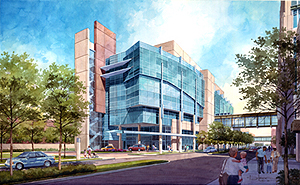Comers give $21 million for new, state-of-the-art Children’s Hospital
Gary Comer, founder of the Lands’ End clothing-catalog company, and his wife, Frances, have made a $21-million donation to help build the University of Chicago Comer Children’s Hospital. Construction of the state-of-the-art, $130-million facility is scheduled to begin in the fall of 2001 and be completed early in 2004. |
The 242,000 square-foot, 155-bed, seven-story facility will provide an ultra-modern, yet child-friendly, setting for all inpatient children’s health services at the University Hospitals, including nationally recognized programs in cardiology, neurology, neonatology, transplantation and other medical and surgical specialties.
“We are tremendously grateful for the extraordinary commitment that Gary and Frances Comer have made to the well-being of children,” said Ralph Muller, President of the University Hospitals. “Their generous gift guarantees that we will remain at the forefront of children’s medicine. Comer Children’s Hospital will provide the best possible setting for superb patient care, pediatric research and training.”
“My wife, Francie, and I are proud to be a part of this project,” said Comer. “It will set the standard for pediatric care in the next millennium and improve the lives of all who come in contact with it.”
“What I like most of all,” he added, “is its location, in the heart of the city of Chicago–my special part of my special hometown. I have long admired the University for its role in anchoring and stabilizing the South Side of Chicago, and this new children’s hospital will be one of our finest achievements.”
The Comer Children’s Hospital will be built one block north of the current children’s hospital. Three hundred fifty-four feet long and 133 feet wide, the new hospital will dominate most of the block, filling one side of Maryland Avenue from 57th to 58th streets. Bridges, tunnels and walkways will connect it to the Bernard Mitchell Hospital, the Duchossois Center for Advanced Medicine and the nearby Ronald McDonald House.
The new hospital will provide the optimal setting for the rapidly advancing technologies in pediatric medicine. It will include two 30-bed medical/surgical units, a two-story, 30-bed pediatric intensive care unit and a neonatal intensive care unit with 10 more beds than the existing unit and with double the space per bed. The new hospital will add six surgical suites, with operating rooms, preoperative areas and recovery rooms designed to suit the specific needs of pediatric and newborn surgical patients.
The Comer Children’s Hospital will bring together this advanced technology with a family-centered, kid-friendly philosophy embraced at the University Children’s Hospital. Patient rooms will be big enough to accommodate family members, and there will be more common spaces for families, including sleeping areas (in addition to beds in the private rooms), a family kitchen and laundry facilities.
“In order to build the pediatric hospital of the future,” added Muller, “we brought together not just doctors and nurses, architects and designers, but also patients of all ages and their families. After all, it is the patients and their families who have to live here while those of us who work here try to help them get better.”
Many unusual components of the building plan came from the Kids’ Advisory Board, a group of current and former pediatric patients who have provided hospital staff and the design team with a child’s perspective on a hospital stay. The children asked for lots of windows, bigger bathrooms, personal bulletin boards in each room, more group areas for socializing, and a food court, preferably containing a McDonald’s. The plan calls for all that and more.
Children and their families will be given an unprecedented level of control over their room environment, including regulating climate and lighting. All rooms will have computers and children will be able to use them to select artwork, play music, access entertainment such as movies or video games, or to communicate with other patients. They also will be able to adjust the height of the showers and choose their own bed linens.
Two architectural firms have worked together to design the building: a team from the Chicago office of HLM Design, the firm that helped design the award-winning Duchossois Center for Advanced Medicine, and one from Stanley Beaman & Sears, based in Atlanta, which designed an award-winning children’s hospital for the Medical College of Georgia. Their mission was to imagine a building that met the medical and social needs of patients and caregivers, complemented the current University architecture campus and reflected both the academic community’s respect for the history of knowledge and a child’s wonder at the process of discovery.
The resulting design incorporated many characteristics of a gothic cathedral, such as a solid, heavy base with increasing use of glass and openness on the upper floors. A series of large pre-cast concrete columns at the ground level will support steel “buttresses.” At the same time, the surface of the structure will feature hints of nature such as bits of ivy molded into the concrete. Copper and glass enclosures, containing open-stair towers at the north and south ends of the building, will serve as “book ends” to the multiple vertical bays, stacked in between them like books.
The new Comer Children’s Hospital will be not only a beacon for our community, but it also will help us to recruit and retain the very best clinical and research faculty to advance pediatric medicine,” said Herbert Abelson, the George M. Eisenberg Professor and Chairman of Pediatrics.
Today’s gift brings the University Hospitals’ fund-raising effort to a total of $33 million, two-thirds of the way to its $50-million goal.
Born and raised on the South Side of Chicago, Gary Comer, 72, started Lands’ End in 1963 and is currently chairman of the board.
![[Chronicle]](/images/small-header.gif)